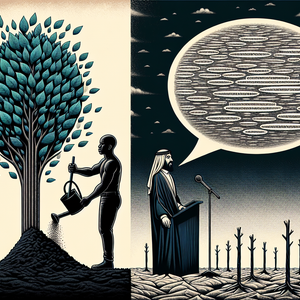From Stacks to Startups: How Librarians Can Transition into the Tech Industry

At first glance, moving from a library to a tech company might seem like a leap into an entirely different universe. However, when you take a closer look, the skill sets and knowledge librarians bring to the table are surprisingly aligned with the needs of the tech industry. Librarians excel in areas like research and information retrieval, metadata management, user-centered design, and content strategy, making them valuable assets in the tech world.
Research and Information Retrieval
Librarians are experts at finding, analyzing, and synthesizing information, whether it's tucked away in a physical archive or embedded in a digital database. These research skills are invaluable for roles such as data analysts, market researchers, or content strategists. For instance, a librarian's ability to efficiently navigate databases parallels the work of a tech professional filtering insights from large datasets.
Metadata Management
Library professionals spend years mastering metadata, cataloging systems, and classification tools like MARC or OCLC. These skills directly translate into roles in metadata management, taxonomy design, and search engine optimization (SEO) within the tech world. Tech companies rely heavily on metadata to make their digital content discoverable and user-friendly, a field where librarians shine.
User-Centered Design (UX)
In many ways, librarians are natural UX (user experience) professionals. They design systems and processes that help users navigate complex information environments. This expertise aligns seamlessly with UX roles in tech, such as usability testing, interface design, and crafting user-friendly content.
Content Strategy
Librarians are skilled in curating information for diverse audiences, ensuring clarity, relevance, and accessibility. This competency is crucial for content strategists in tech, who are tasked with storytelling, editorial planning, and developing coherent digital ecosystems for users.
Navigating the Transition
The prospect of transitioning from the library world to the fast-paced tech industry can feel daunting. However, by breaking the process into manageable steps, librarians can set themselves up for success. Strategies include identifying transferable skills, upskilling strategically, building a portfolio, networking with tech professionals, and tailoring resumes and cover letters to reflect industry language.
Identify Transferable Skills
Start by mapping your existing skills to roles in tech. For example, familiarity with cataloging software like MARC can translate into proficiency with metadata tools or taxonomy systems. Experience teaching patrons how to use databases aligns with roles in technical support or training. Organizational skills used to classify books and resources can be leveraged in improving search algorithms or designing content taxonomies. By framing your library experience in the context of tech, you can position yourself as a competitive candidate.
Upskill Strategically
While librarians possess a wealth of transferable skills, gaining additional technical expertise can make you stand out. Consider investing in coding and data skills, UX design, and content management systems (CMS). Even a basic understanding of these tools can give you a competitive edge in the job market.
Build a Portfolio
Tech employers often value tangible proof of your skills. Create a portfolio that showcases your work, such as a redesigned library catalog interface, metadata projects that demonstrate improved searchability, or curated digital collections that highlight your content strategy skills. A strong, visually appealing portfolio can significantly boost your credibility during job applications.
Network with Tech Professionals
Networking is one of the most effective ways to break into a new industry. Attend tech meetups, join online forums, or connect with professionals on LinkedIn. Highlighting your unique background as a librarian can make you stand out, as tech companies often value diverse perspectives.
Tailor Your Resume and Cover Letter
Tech companies may not immediately understand library-specific terminology, so tailor your application materials to reflect industry language. For instance, instead of 'cataloged library materials,' write 'developed metadata systems to improve information retrieval.' Replace 'taught database navigation to patrons' with 'conducted user training to enhance digital literacy.' This simple shift in language can help hiring managers see the relevance of your experience.
Real-Life Success Stories
The transition from librarianship to tech is not only possible—it’s been done successfully by many professionals. Examples include Sarah, who transitioned to a metadata manager role at an e-commerce company; Alex, who became a UX writer for a mobile app; and Emma, who moved from curating physical archives to managing digital content for a tech startup. These success stories highlight how librarians can apply their existing skills to thrive in a new industry.
Why Librarians Excel in Tech
Librarians bring a unique blend of problem-solving, critical thinking, and empathy to the tech world. Their ability to organize chaos, design systems for knowledge-sharing, and connect people with the information they need makes them indispensable in roles like UX design, data management, and content strategy. Additionally, librarians’ lifelong learning mindset equips them to adapt quickly to new challenges and technologies. In an era dominated by data and digital transformation, the tech industry highly values professionals who understand how to manage, structure, and present information effectively.
Transitioning from the library world to the tech industry may feel like stepping into uncharted territory, but it’s a journey filled with opportunity. By identifying transferable skills, acquiring additional training, building a strong portfolio, and networking strategically, librarians can unlock a wealth of career possibilities in tech. The demand for professionals who can organize, curate, and make sense of vast amounts of information is higher than ever. Librarians, with their unique expertise, are not just relevant—they’re indispensable in today’s digital landscape. Whether it’s metadata management, UX design, or content strategy, the tech industry is ready for knowledge keepers like you. So, are you ready to make the leap from stacks to startups? The future is yours to write.
Metadata Specialist
E-commerce companies (e.g., Amazon, Wayfair), digital asset management firms, academic publishers, and media organizations
Key Responsibilities
Design and maintain metadata schemas to enhance the discoverability of digital assets.
Collaborate with development teams to ensure metadata standards align with search engine optimization (SEO) and database requirements.
Audit and improve existing metadata for accuracy and consistency across platforms.
Required Skills
Proficiency in cataloging standards like MARC, Dublin Core, or schema.org.
Familiarity with metadata tools such as OpenRefine or XML editors.
Analytical thinking and attention to detail for organizing and classifying large datasets.
UX Researcher
Tech companies like Google, Microsoft, and startups focused on app development or software design
Key Responsibilities
Conduct user interviews, usability testing, and surveys to understand customer needs and behaviors.
Analyze qualitative and quantitative data to inform design decisions for websites, apps, or software.
Collaborate with designers and developers to create intuitive, user-friendly interfaces.
Required Skills
Strong understanding of user-centered design principles and tools like Figma, Axure, or Adobe XD.
Experience with research methods such as A/B testing, card sorting, or eye-tracking studies.
Excellent communication skills to present research findings to stakeholders.
Content Strategist
Marketing agencies, tech startups, and large corporations with a digital presence, such as HubSpot, Salesforce, or IBM
Key Responsibilities
Develop and implement content strategies for websites, blogs, and social media platforms to improve user engagement.
Audit, organize, and tag digital content to ensure relevance and accessibility for diverse audiences.
Work with cross-functional teams to maintain brand voice and align content with business goals.
Required Skills
Expertise in content management systems (CMS) like WordPress, Drupal, or Adobe Experience Manager.
Ability to analyze content performance metrics using tools like Google Analytics or SEMrush.
Strong editorial and organizational skills to manage complex content ecosystems.
Data Analyst (Focus on Information Retrieval)
Financial institutions, healthcare companies, and tech giants like Meta or Netflix
Key Responsibilities
Collect, clean, and analyze large datasets to identify patterns and insights relevant to business goals.
Develop algorithms, queries, and dashboards to improve data retrieval for stakeholders.
Collaborate with teams to optimize search functionalities and information architecture.
Required Skills
Proficiency in programming languages like Python, R, or SQL for data analysis.
Experience with data visualization tools like Tableau or Power BI.
Strong problem-solving skills, particularly in structuring complex datasets and ensuring data quality.
Taxonomy Designer
Media companies (e.g., Netflix, Spotify), e-commerce platforms, and knowledge management firms
Key Responsibilities
Create and implement controlled vocabularies, ontologies, and taxonomies to structure digital content.
Work with search teams to enhance search engine functionality and relevance.
Conduct usability testing to validate and refine classification systems.
Required Skills
Knowledge of information architecture and tools like Protégé, PoolParty, or OntoStudio.
Expertise in hierarchical classification and tagging systems.
Ability to collaborate with content teams and developers to implement taxonomies effectively.


